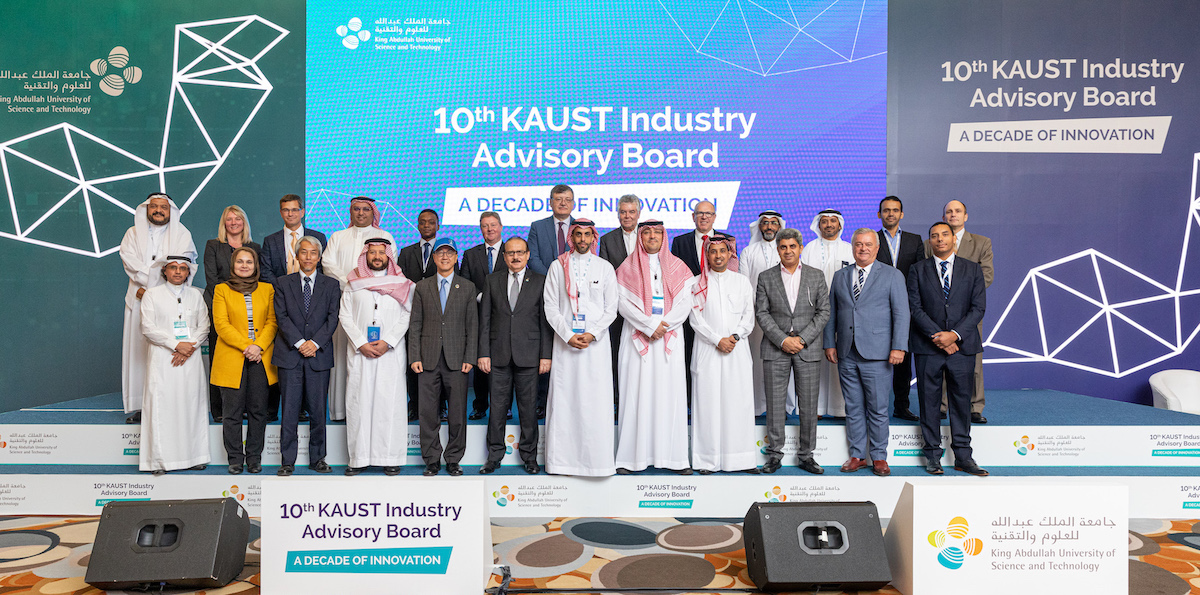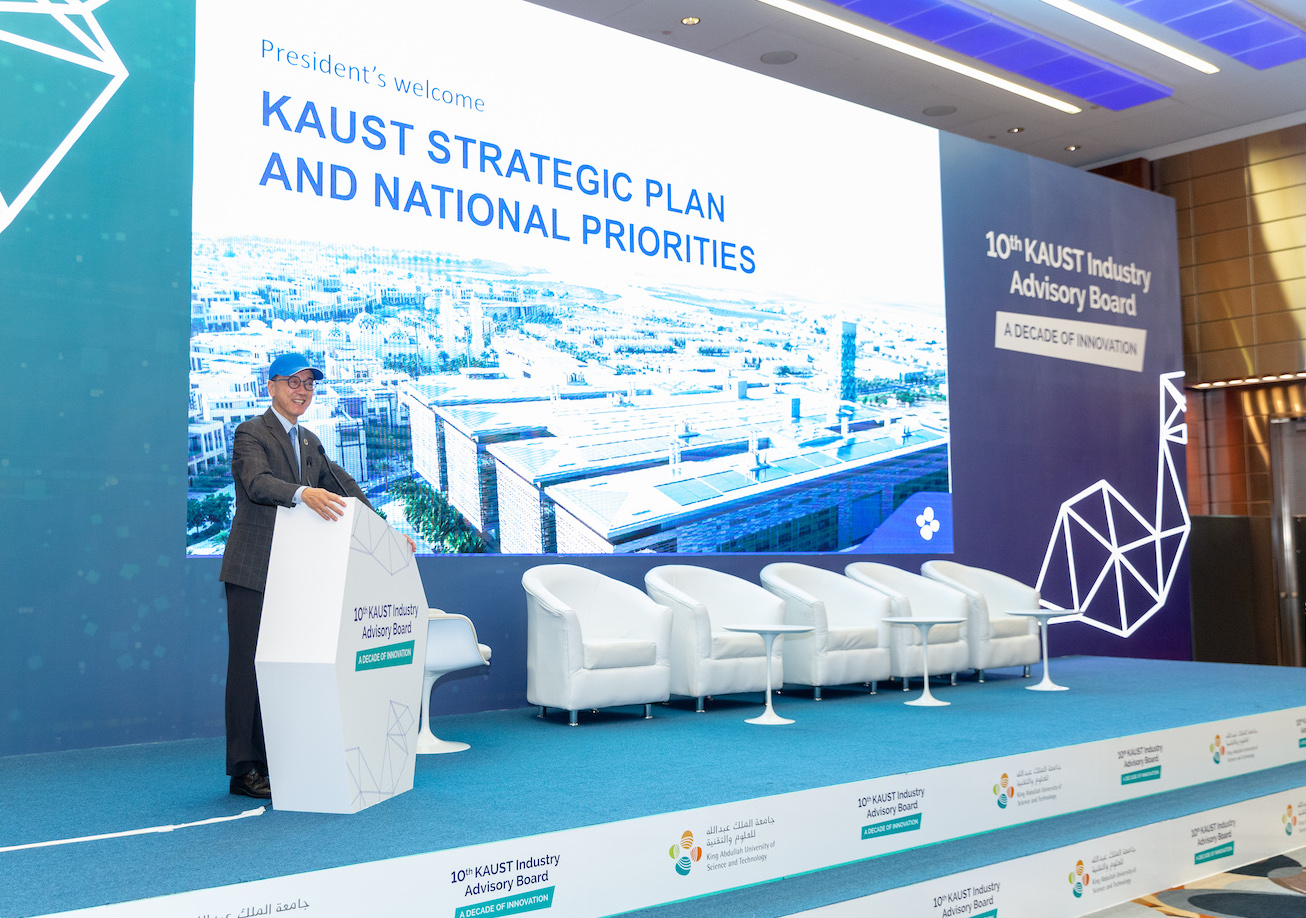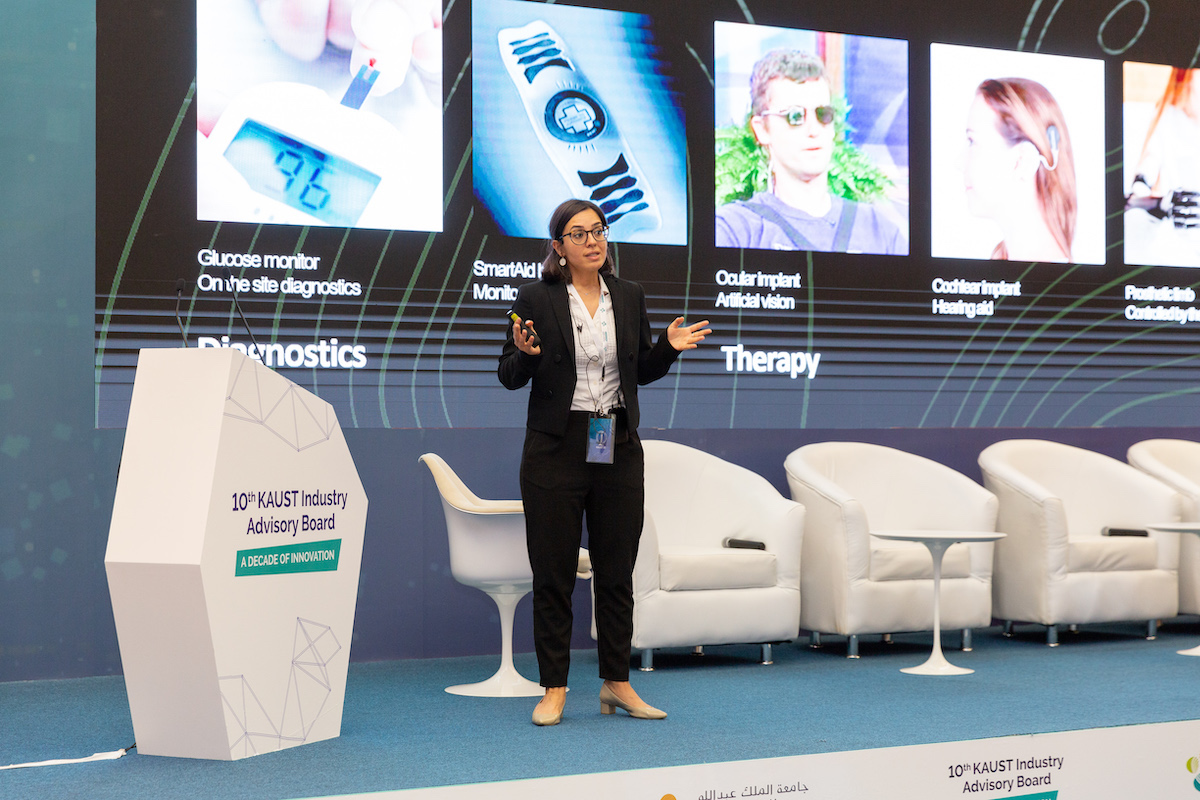KAUST Industry Advisory Board meeting celebrates a decade of innovation

The University's senior leadership and 26 executive-level industry representatives who are members of KAUST’s Industry Collaboration Program recently took part in the 10th KAUST Industry Advisory Board meeting on campus. File photo.
By Aurelie Arsouze, KAUST Innovation & Economic Development
The University held the 10th KAUST Industry Advisory Board (KIAB) meeting from November 4 to 5. The annual signature meeting puts the University's research, education and economic development activities at the center of a two-day discussion with industry partners on campus.
In September, KAUST celebrated its first decade as a university, a milestone marked by significant academic achievements and an ambitious vision for the future. The 2019 KIAB meeting highlighted milestone achievements over the last 10 years and also focused on future research and economic development plans—with an eye to the Kingdom's Vision 2030. The meeting, which was chaired by KAUST President Dr. Tony Chan, included the participation of 26 executive-level industry representatives who are members of KAUST's Industry Collaboration Program (KICP).
A decade of industry-academic innovation
Developed in 2009, the KICP was created to help companies leverage the University's human and technological resources. The program assists industry in finding tailored ways to help access KAUST and transform business needs into innovative products, processes and the technologies of tomorrow.
Over the past decade, more than 40 R&D-intensive companies have collaborated with KAUST as a part of the program, including both Saudi and international organizations, with a focus on advancing research and development in the Kingdom.
Today, there are 26 KICP member companies: Air Liquide; Abdul Latif Jameel; Boeing; Dow Chemical; Total; Raytheon; Air Products; Halliburton; IBM; Lockheed Martin; NALCO; SABIC; Saudi Aramco; Schlumberger; Siemens; SipChem; Sumitomo Chemical; the Royal Commission at Yanbu; Industrial Clusters; KAPSARC; K.A.Care; SWCC; SEC; Taqnia; SAGIA; and NWC.

KAUST President Dr. Tony Chan gives the opening remarks at 2019's KAUST Industry Advisory Board meeting. File photo.
Over the past 10 years, KICP members have funded more than 150 research projects with the University's faculty members. Some notable examples include the Saudi Aramco-funded establishment of the Ali Al-Naimi Petroleum Engineering Research Center and the Marine Research Center, with over $30M in funding for Red Sea research; Halliburton granting 15 software licenses to KAUST; and SABIC supporting more than 55 postdoctoral fellowships and sponsoring five assistant professors.
Together, Saudi Aramco and KAUST completed the world's first trillion cell reservoir simulation in 2016 using Shaheen, the University's supercomputer, in partnership with the KAUST Core Labs. KICP members also hire over 25 percent of the University's graduates and employ 160 highly skilled employees in the KAUST Research and Technology Park.
KIAB 2019
This year's KIAB program highlighted over 10 years of innovation and the achievements of the present, and it also looked to the future.
President Chan delivered the event's opening remarks, focusing on KAUST's strategic plans and new national priorities.
"We are creating new research initiatives—we already have energy, water, environment and food, and we are now launching new initiatives in AI, smart-health and impact-focused translational research," he stated.
The new focus highlights a shift towards research that is increasingly intersected by digital technologies, such as machine learning and supercomputing.
Dr. Kevin Cullen, KAUST vice president of Innovation & Economic Development, speaks to the audience during the recent KAUST Industry Advisory Board meeting. File photo.
Both days of the event emphasized health technology and the impact it may have in the Kingdom. The opening keynote was from Eng. Abdullah Al-Mintashry, senior director of pharmaceuticals at Saudi Industrial Clusters. Al-Mintashry discussed the role that Saudi Arabia can play in pioneering the pharmaceutical industry in the Middle East.
"Why is pharma important for the Kingdom?" he asked. "We have a big ask and a big market—nearly $8.2 billion—and we are well-positioned to be an export nation."
By 2030, the Kingdom is expected to host 30 million pilgrims for Hajj and Umrah, significantly increasing the demand for pharmaceutical products and particularly for mandatory vaccines. KAUST is playing a significant role in establishing the Kingdom's nascent bio park and developing a pilot scale vaccine facility—the Saudi Vaccine and Biopharmaceuticals Company—on campus, in partnership with SaudiVax, KACST, Research Products Development Company and Industrial Clusters.
Dr. Donal Bradley, KAUST vice president for research, shared his thoughts on tomorrow's world in a foresighting exercise at the event about the University's research beyond 2030. Focusing on health, food, water, energy and electronics, he stated that thinking about the future "can help us identify things that can cause significant disruption."

KAUST Assistant Professor Sahika Inal answers questions during a portion of the 2019 KAUST Industry Advisory Board meeting. File photo.
Bradley then introduced KAUST Professors Sahika Inal, Salim Al-Babili, Matthew McCabe, Mani Sarathy and Thomas Anthopoulos, who answered critical questions about scaling access to healthcare, food, water, transportation and electronics in the face of growing demand and increasingly limited global resources.
New collaboration opportunities signed at KIAB
Industry plays an important role in creating impact from University research, explained Kevin Cullen, KAUST vice president of innovation and economic development.
"Corporate partners engage with universities in a wide variety of ways, including licensing IP, consultancy, collaborating on research and using our facilities. All of these mechanisms and relationships enable a flow of knowledge, helping our industry partners to create impact in the economy and society in the form of new products, services and jobs," Cullen noted.
Three companies signed agreements with KAUST during KIAB:
- Air Products signed a Master Research Agreement for sponsored research with the KAUST Clean Combustion Research Center.
- KP4RE signed an MoU to initiate solar research collaborations with KAUST.
- Asel Tech signed an agreement with the KAUST Research and Technology Park, becoming the 42nd tenant.
Future goals
Always looking to the future, the 10th KIAB meeting focused on uniting the University's dual mission of academic excellence with economic development and continuing the University's progress in contributing to the Kingdom's Vision 2030.

